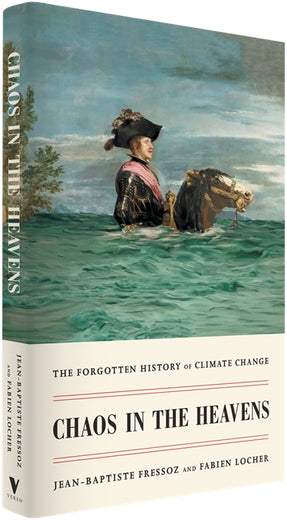Hardback
+ free ebook

+ free ebook
Politicians and scientists have debated climate change for centuries in times of rapid change
Nothing could seem more contemporary than climate change. Yet, in Chaos in the Heavens, Jean-Baptiste Fressoz and Fabien Locher show that we have been thinking about and debating the consequences of our actions upon the environment for centuries. The subject was raised wherever history accelerated: by the conquistadors in the New World, by the French revolutionaries of 1789, by the scientists and politicians of the nineteenth century, by the European imperialists in Asia and Africa until the Second World War.
Climate change was at the heart of fundamental debates about colonisation, God, the state, nature, and capitalism. From these intellectual and political battles emerged key concepts of contemporary environmental science and policy. For a brief interlude, science and industry instilled in us the reassuring illusion of an impassive climate. But, in the age of global warming, we must, once again, confront the chaos in the heavens.
A truly fabulous book -- surprising, thought-provoking and rich in historical irony. It is a necessary corrective to the narrative which makes the emergence of climate change as a matter of concern relatively recent and incremental. But it is more enlightening, more provocative and more entertaining than any mere necessity would have required.
The upshot of this brilliant book is that historians have been asking the wrong question. For years we've been trying to date the emergence of a consciousness about the impacts of human activities on Earth's climate. But this awareness long predates modern science, as we learn from the authors' pathbreaking research. The real question, the one at the heart of their book, is why this awareness was always ambivalent and why it evaporated at the turn of the twentieth century. If you want to understand the long path to the climate crisis, read this book.
This brilliant book turns upside down the received story of climate science. Fressoz and Locher uncover a rich awareness of climate change in early modern times centered on forests and water. But with the advent of industrial society in the nineteenth century, wealthy Western nations embraced a new indifference to climate. If Fressoz and Locher are right, we need to look to the past to understand why climate mitigation has met with such fierce resistance in the present moment. Behind the climate denial of the oil lobby lies the Victorian faith in the imperturbable sky.
At once a cry of alarm and a global call to action, Chaos in the Heavens is a pathbreaking book which reveals not only that debates about climate change are centuries-old but also that our current apathy stems primarily from a false story of optimism and capitalist technophilia developed during the 20th century. Perhaps even more important, though, is the warning at the heart of this remarkable book that stories of climate change crises have been used to generate profits and been abused to wield many kinds of power over the most vulnerable on our planet for longer than we realize.